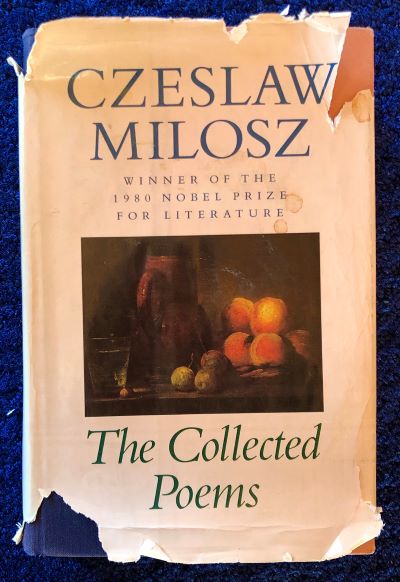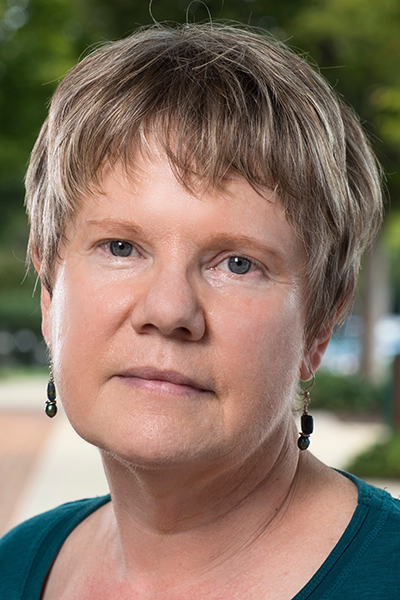The Collected Poems is neither the newest nor the most complete English language edition of Czesław Miłosz’s poems, but it is a book I have loved since its publication in 1988. The newer edition, New and Collected Poems, 1931-2001, mostly sits on the shelf, while this one grows more tattered and tea-stained by the year.
Each time I open it, I am carried back to the years in which Miłosz, more than any other, made it impossible for me to rest in either history or lyric, expansion or intensity—the polar temptations of poetry.
Like other poets of witness I was reading, his work made clear that reducing suffering to the representation of suffering is a wretched and insufficient act, from which no worker in language can escape, yet to not represent suffering is mere cowardice. Yet Miłosz went further, forcing me to consider the ethical implications of any reduction of the concrete and particular to a set of propositions. An early poem asks:
What is poetry that does not save
Nations or people?
A connivance with official lies,
A song of drunkards whose throats will be cut in a moment,
Readings for sophomore girls.
Yet these are not lines without context. Between the title, “Dedication,” and the date, “1945” that trails the final line, they address “You whom I could not save,” and whom no poetry could save.
Miłosz’s early biography is extraordinary. Born in Lithuania in 1911 to a Lithuanian mother and a Polish father, as a small boy he traveled through Russia with his father, a combat engineer drafted into the Czar’s army, a peculiar vantage point from which to form a historical consciousness. In the 1930s he joined leftist student and literary organizations, though his Lithuanian upbringing kept him stubbornly anti-Russian.
When the USSR invaded in 1940, he escaped from Lithuania into German-occupied Poland, believing that the bureaucratic oppression of Soviet Russia was permanent, while an evil as extreme as the Third Reich would inevitably be short-lived. Finding work as a janitor at the Warsaw University library, he joined the Socialist resistance, publishing anti-Nazi poems under a pseudonym. When the Germans looted the library, he was assigned to trundle books across the ruined city in a wheelbarrow. Being free to pilfer, he once found himself pinned down by crossfire with a copy of T.S. Eliot’s The Waste Land in his pocket—a moment so prescient it seems fictional.
In post-war years Miłosz served briefly as a cultural attaché in Poland’s embassy in Paris, before defecting in 1951. By 1960 he was lecturing in Polish literature at the University of California, Berkeley, and soon after accepted a professorship, which he held until winning the Nobel Prize for Literature in 1980. He died in 2004.
Biographical sketches of Miłosz rarely contain more than that, as if four decades in California—where, after all, he wrote most of his books—comprise a mere footnote to his early life. We are now blessed with Cynthia L. Haven’s Czesław Miłosz: A California Life, portraying this history-soaked European at work in the ahistorical milieu of Berkeley, from the anti-war heyday of the 1960s into this century. I did not choose California, he wrote in “The Separate Notebooks,” it was given to me.
But the Miłosz whose story seemed to end in 1980 is the Miłosz I found, just a few years later in The Collected Poems. His quarrels and debates with California—and with everything else, from the Catholic Church to the slippery and duplicitous powers of language itself—I met in the poems, and as poems. His dialectical movement through image and statement, history and lyric, was a revelation, a poetic practice that, in itself, opposed authoritarian thinking—literally a form of resistance.
My generation was lost. Cities too. And nations.
But all this a little later. Meanwhile, in the window, a swallow
Performs its rite of the second.1
Though editors positioned him solely in relation to events and atrocities he had witnessed, I also found in Miłosz’s work a particularity so alive that at least for a few lines I could sail on the ship of art, transcending time. It was this quality, interleaved with unimaginable loss, anger, and self-incrimination, that signaled genuine survival.
Between her and me there was a table, on the table a glass.
The chapped skin of her elbows touched the shining surface
In which the contour of shade under her armpit was reflected.2
On the corner, a bookstore; but not books, just sheaves of paper
Up to the very ceiling. Unbound, tied with string.3
And yet, such restorations are needed, are constantly enacted, because the poet knows they not only fail, but should fail. A poem made solely of images, voicing no awareness of history, and therefore no awareness of its own predicament, would, for Miłosz, be no more than a temptation.
…I think reluctantly of the house between the lakes
and of nets drawn in beneath the Lithuanian sky.
The bath cabin where you used to leave your dress
has changed forever into an abstract crystal.4
In “With Trumpets and Zithers” Miłosz invokes escape, a Dionysian ecstasy by which the conscious self might merge into a collective whole, via the senses—”the scent of clover” and “tongues fornicating with tongues,” where “the same ocean runs in, beating its ecstatic drums.” But when the spell breaks, there we are: neither he nor we have escaped the love of the individual, the particular thing, this moment like no other. Against the Greek idea that only what is subsumed into the whole endures, the poet shouts back, though he knows even language is not on his side.
What separates, falls. Yet my scream “no!” is
still heard though it burned out in the wind.
Only what separates does not fall. All the rest is beyond persistence.
I wanted to describe this, not that, basket
of vegetables with a redheaded doll of a leek laid across it.
And a stocking on the arm of a chair, a dress crumpled
as it was, this way, no other…
In vain I tried because what remains is the ever-recurring basket.
And not she whose skin perhaps I, of all men, loved, but a
grammatical form.5
To persist in time is to be an individual, a life. To exist only as a grammatical form is to be taken out of time. Only after years of reading Miłosz did I understand that, for him, to live on in this form of immortality is not a triumph of art, but a marker of absolute loss.
For me, his reader, the losses that are personal for the poet are, indeed, mere grammatical forms, written once in Polish, again in English, as uprooted and exiled as the poet himself. Yet from them a dialectical truth emerges, like a sound that reverberates from one surface to another and cannot be fully heard from any one position. It brings us in language the very things it tells that language cannot restore, letting us see them at the precise moment they slip away—an honest and defiant action no oppressor will ever understand.
*
Czesław Miłosz: New and Collected Poems, 1931-2001 is available from Ecco Press.
1. “From the Rising of the Sun, II: Diary of a Naturalist,” Berkeley, 1973-1974 (p.258)
2. “Bobo’s Metamorphosis,” Berkeley, 1962 (p.166)
3. “From the Rising of the Sun, VII: “Bells in Winter” (p.309)
4. “Elegy for N.N.,” Berkeley, 1963 (p.239)
5. “With Trumpets and Zithers, # 6,” Berkeley, 1965 (p.198)




